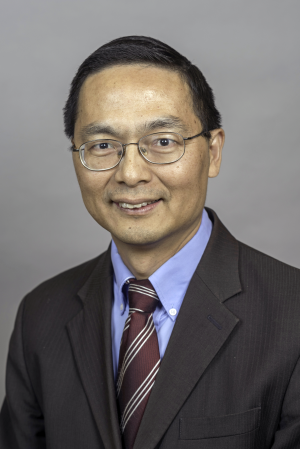
Date:
Location:
Speaker:
ABSTRACT:
Synthetic biology is the design of novel or improved biological systems using engineering principles. It is a rapidly growing area with broad applications in medical, chemical, food, and agricultural industries. In this talk, I will highlight our recent work in the development and application of novel foundational synthetic biology tools. Specifically, I will introduce four interrelated stories, including: (1) development of the Illinois Biological Foundry for Advanced Biomanufacturing (iBioFAB) for next-generation synthetic biology applications; (2) development of new strategies and tools for discovery of novel natural products from sequenced genomes and metagenomes; (3) development of genome-scale engineering tools for rapid metabolic engineering applications, and (4) integration of biocatalysis and chemical catalysis for synthesis of value-added chemicals.
BIO:
Dr. Huimin Zhao is the Steven L. Miller Chair of chemical and biomolecular engineering, and professor of chemistry, biochemistry, biophysics, and bioengineering at the University of Illinois at Urbana-Champaign (UIUC). He received his B.S. degree in Biology from the University of Science and Technology of China in 1992 and his Ph.D. degree in Chemistry from the California Institute of Technology in 1998 under the guidance of Dr. Frances Arnold. Prior to joining UIUC in 2000, he was a project leader at the Industrial Biotechnology Laboratory of the Dow Chemical Company. He was promoted to full professor in 2008. Dr. Zhao has authored and co-authored over 300 research articles and over 25 issued and pending patent applications with several being licensed by industry. In addition, he has given over 370 plenary, keynote, or invited lectures. Twenty-six (26) of his former graduate students and postdocs are pursuing academic careers. Dr. Zhao received numerous research and teaching awards and honors such as Marvin Johnson Award (2018), Charles Thom Award (2016), and Elmer Gaden Award (2014). His primary research interests are in the development and applications of synthetic biology tools to address society’s most daunting challenges in health, energy, and sustainability, and in the fundamental aspects of enzyme catalysis, cell metabolism, gene regulation, and cell differentiation.
Relevant publications:
M. M. Zhang, F. Wong, Y. Wang, S. Luo, Y. H. Lim, E. Heng, W. L. Yeo, R. E Cobb, B. Enghiad, E. Ang, and H. Zhao. “CRISPR-Cas9 Strategy for Activation of Silent Streptomyces Biosynthetic Gene Clusters.” Nature Chemical Biology, 13, 607-609 (2017).
J. Lian, M. HamediRad, S. Hu, and H. Zhao. “Combinatorial Metabolic Engineering using an Orthogonal Tri-functional CRISPR System.” Nature Communications, 8:1688 (2017)
Z. Bao, M. HamediRad, P. Xue, H. Xiao, I. Tasan, R. Chao, J. Liang, and H. Zhao. “Genome-scale Engineering of Saccharomyces cerevisiae with Single Nucleotide Precision.” Nature Biotechnology, 36, 505–508 (2018).
Z. Litman, Y. Wang, H. Zhao, and J. F. Hartwig. “Cooperative Asymmetric Reactions Combining Photocatalysis and Enzymatic Catalysis.” Nature, 560, 355-359 (2018).
B. Wang, F. Guo, S. H. Dong, and H. Zhao. “Activation of Silent Biosynthetic Gene Clusters Using Transcription Factor Decoys.” Nature Chemical Biology, 15, 111–114 (2019).



